Law Professor Cheryl Wattley Wins Exoneration of Ben Spencer, Wrongfully Convicted 37 Year Ago
August 30, 2024
Ben Spencer’s road to freedom runs right through the UNT Dallas College of Law. It was a long, circuitous, torturous journey.
Spencer spent 37 years not only claiming his innocence but exclaiming it. The wrongly convicted Dallas man, who was arrested in 1987 for a murder he didn’t commit, was finally exonerated on August 29, 2024, by a Dallas County judge who apologized to Spencer in open court as cameras captured the emotional moment.
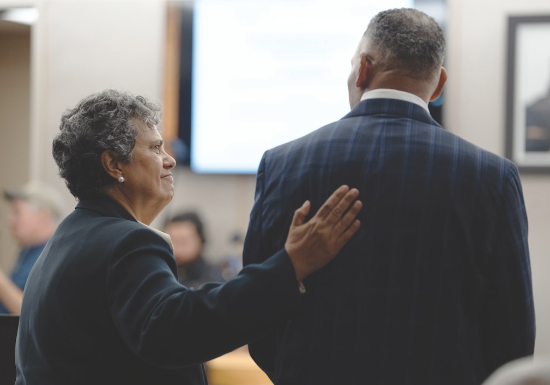
“Now I can live life,” Spencer said. “It’s different than just living.”
UNT Dallas law professor Cheryl Wattley founded the college’s Joyce Ann Brown Innocence Clinic and has represented Spencer for the past 23 years. She tirelessly and persistently navigated the many ups and downs the case took through the Texas criminal justice system. This is the Innocence Clinic’s first exoneration.
Wattley hosted a reception in Spencer’s honor several hours after his final court hearing. It was a celebration that had been decades in the making, attended by attorneys and legal advocates, Spencer’s family, friends and supporters, other exonerees, journalists, and law students.
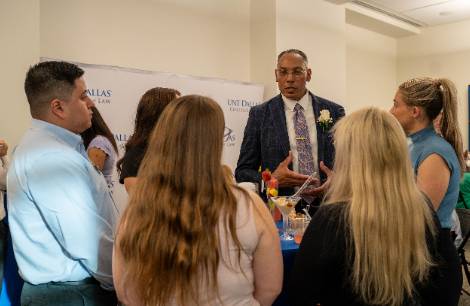
“Trials are how you find the truth,” Wattley told the audience, “They’re about not taking the easy path; they’re about doing the hard work.” Wattley herself is an accomplished prosecutor and defense attorney.
She revealed what others close to the case discovered after Dallas County District Attorney John Creuzot ordered his office’s Conviction Integrity Unit to re-investigate in 2019. “They found files that showed a witness had received money,” Wattley said, from Crimestoppers and a reward fund set up by the victim’s employer, which may have encouraged her false statements. “And other information that was withheld from the defense.” It was a clear-cut case of prosecutorial misconduct.
Indeed, Spencer’s conviction for aggravated battery (in a second trial after the original murder conviction was overturned on appeal) might have been thrown out earlier if previous DAs had acted on Wattley’s and others’ pleas for the case to be put under a new microscope.
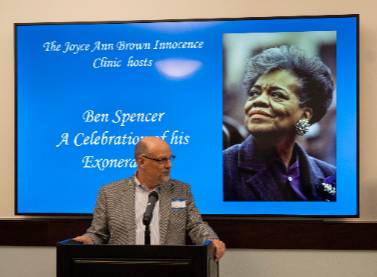
Even the jury foreman in the first trial, Alan Ledbetter, became convinced of Spencer’s innocence, following the twists and turns of the case and corresponding with Spencer during this incarceration. Quoting John Grisham, the crime novelist and author of a non-fiction book, “The Innocent Man,” Ledbetter said, “Wrongful convictions and exonerations happen every month in every state.” Grisham plans to publish another non-fiction book, “Framed,” about another real-life case later this year.
According to Grisham, Ledbetter explained, these cases have many similarities, including bad policing, junk science, faulty witnesses, bad lawyers, and lazy, often arrogant prosecutors. “Develop skills as a counselor,” he told the law students. “And always chat with jurors after a trial, especially if you lose. They can tell you how and where you screwed up.”
Other “brotherhood of exonerees” members cheered Spencer, including Richard Miles, whom Wattley also represented. Many attendees admired Spencer’s patience, even-keeled demeanor, and faith in God.
Spencer’s wife and son were there, too. At his request, she and Ben divorced while he was in prison, but despite the split, she stayed committed to him, and after he was freed, they married again on the same month and day as their original wedding.
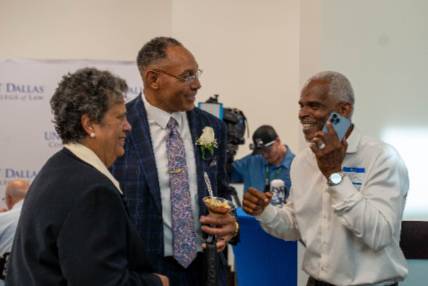
In addressing her Criminal Law students at the reception, which served as experiential education in the truest sense, Wattley said, “When you have power, don’t be afraid to use it. Use it rightfully; use it justly.” She added, “Pour yourself into your cases, but remember, it doesn’t matter until you take it across the goal line.”
For the UNT Dallas College of Law students fortunate enough to hear the words of Wattley, Spencer, Ledbetter, and others, the historic legal event may be one of their most memorable days in law school. Not all knowledge is learned in a textbook or lecture.
The Spencer exoneration attracted local and national attention, including National Public Radio coverage. Former NPR reporter Barbara Bradley Hagerty, who investigated the case herself, wrote a book called “Bringing Ben Home.” Spencer’s first one-on-one interview after the exoneration hearing was with NPR.
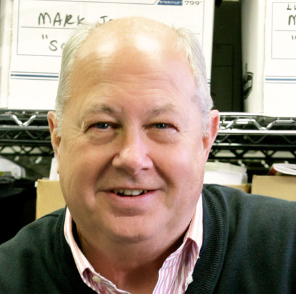
Centurian Ministries, an organization that advocates for people who believe they have been wrongfully convicted, was also instrumental in the Spencer case. After receiving a letter from Spencer, Centurian Ministries founder Jim McCloskey referred the case to Wattley. Gary Udashen from the Innocence Project of Texas served as Wattley’s co-counsel.
Despite the hardship, spending more than half of his 59 years behind bars, the victim of a flawed prosecution, and rebuffed through numerous attempts at justice, Spencer still stays positive. In the end, he said, “The system worked.”
Under Texas law, Spencer can receive $80,000 for each year he was falsely imprisoned,
adding up to more than $2.7 million.
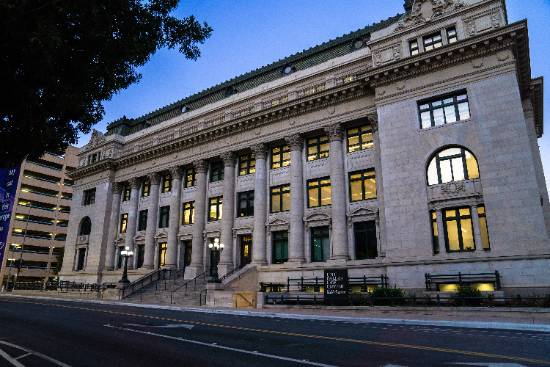
The UNT Dallas College of Law and the Joyce Ann Brown Innocence Clinic are proud to have played an integral role in Ben Spencer’s exoneration. It is the 46th exoneration in Dallas County since 2001. If you know someone who believes they have been wrongfully convicted in Texas, they should fill out this form and mail it to the Innocence Clinic at 1901 Main Street, Dallas, Texas 75201.
At UNT Dallas College of Law, we want our students to always remember that we represent people—we are not just handling cases. Naming the clinic after a person who fought for her freedom and exoneration inspires our students as they work to free others wrongfully convicted.
We are proud to have Joyce Ann Brown as our namesake. In 1980, she was convicted of aggravated robbery and served nine years, five months, and 24 days for a crime she did not commit. With the help of Centurion Ministries and a CBS “60 Minutes” broadcast, Brown’s case was brought back before the courts in Dallas.
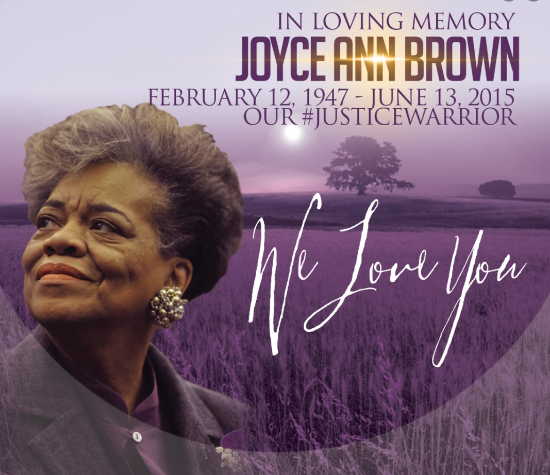
In 1989, the Texas Court of Criminal Appeals reversed her conviction, finding that there had been prosecutorial misconduct. The Dallas County District Attorney decided not to retry Brown. In 1993, her record was expunged. Her exoneration was fully recognized, although she never received any monetary compensation from the state of Texas.
After her release, Brown dedicated her life to telling her story and working on cases of actual innocence. She was the author of the memoir Joyce Ann Brown: Justice Denied, which shared her battle for justice, even behind the prison walls. She founded MASS, Inc., an organization dedicated to aiding the transition of formerly incarcerated persons and those claiming actual innocence. Until her untimely death on June 13, 2015, Brown was a nationally recognized, strong, and devoted advocate for persons who have been incarcerated.